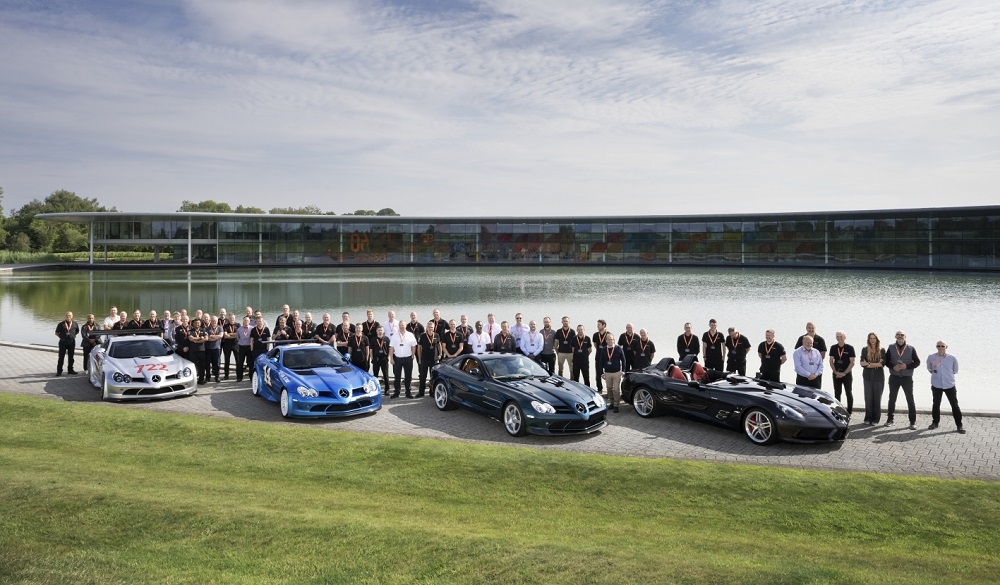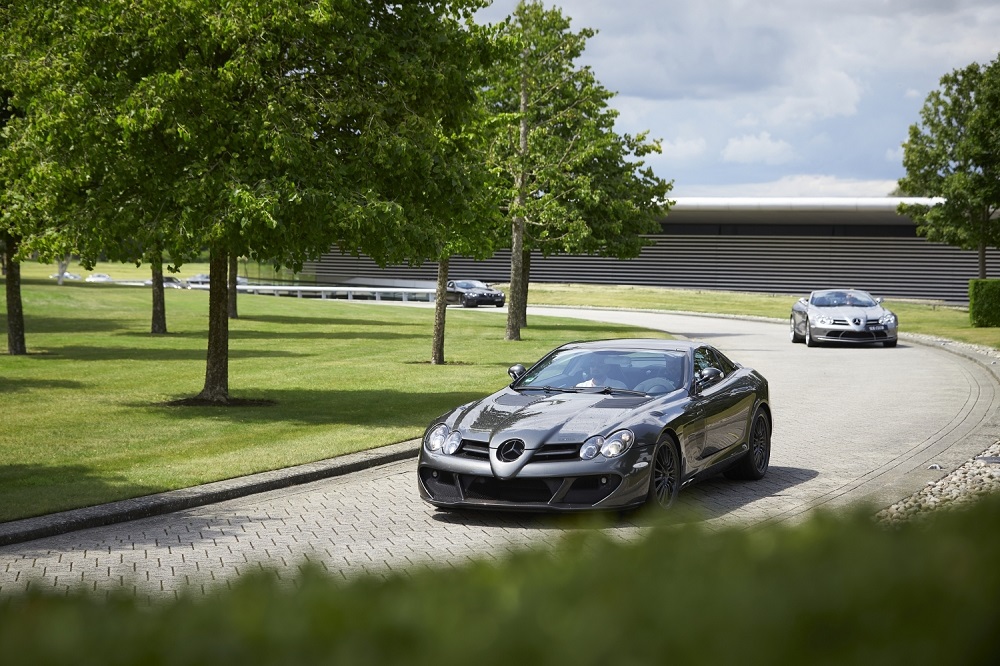McLaren is marking two decades since the 2003 debut of the Mercedes-Benz SLR McLaren with a range of activities at the McLaren Technology Centre (MTC) in Woking, UK.
Born out of a F1-inspired
collaboration between Mercedes-Benz and McLaren, the pioneering super-GT
is a unique chapter in the McLaren story. The activities at MTC reflect
this, recognising not only the car but also the people who brought it
to life, a strong number of whom are still with McLaren.
Four
examples of the grand tourer designed and engineered to supercar
standards - an SLR Stirling Moss, an SLR by MSO, an SLR HDK and the SLR
722 GT Prototype - were showcased on the MTC Boulevard, alongside items
from the car’s development story. A visit to MTC by the SLR Club - an
international group of Mercedes-Benz SLR McLaren owners - added further
colour to the events, with the enthusiasts meeting some of the McLaren
team that worked on the project to celebrate two decades of the car.
The
Mercedes-Benz SLR McLaren project was announced at 1999 British Grand
Prix at Silverstone, with confirmation that McLaren would partner with
Mercedes-Benz to take the Mercedes-Benz SLR Vision concept shown earlier
that year at the Detroit Auto Show from show stand to the road, as a
full production car developed under the name of "Project 7".
McLaren
and Mercedes-Benz were partners in F1 between 1995 to 2009, during
which McLaren won four Formula 1 World Championships (Constructors’
champions in 1998, Drivers’ champions in 1998, 1999 and 2008). This
winning combination of McLaren chassis development and carbon fibre
technology with Mercedes engine power would be replicated for owners of
the Mercedes-Benz SLR McLaren.
The first Project 7 prototype was
built by a team of ex-F1 McLaren mechanics who then joined with
automotive engineers to form the core team that would take the car into
production, as the first car to be hand-assembled at the then newly
opened MTC.
The shape and styling of the car were kept as close
to Mercedes’ requirements - and the design expressed by the Vision SLR
concept - as possible. This was only realised through ground-breaking
engineering, leveraging McLaren’s expertise in carbon fibre composites
learned through decades of experience in F1 and the McLaren F1 road car.
Allied
to the innovative carbon fibre developments was a 5.5-litre
supercharged V8 developed by Mercedes-AMG, producing 626 PS and 780 Nm
of torque. Driving the rear wheels via a five-speed automatic
transmission, the performance of the front-mid engined super-GT more
than matched up to the supercars of the era, with 0-62 mph in 3.8
seconds and a maximum speed of 208 mph.
Production of the car
that began its life as Project 7 ended in December 2009, but this did
not end McLaren’s involvement with the car. In 2010, the newly created
McLaren Special Operations (MSO) introduced the McLaren Edition SLR, an
enhancement package for the Mercedes-Benz SLR McLaren created through
invaluable feedback from SLR owners and MSO customers. This version of
the SLR, limited to just 25 examples, featured significant bodywork
alterations with the adoption of a new, aerodynamically sculpted front
apron with a larger front splitter, new side intakes, a larger rear wing
and a revised rear diffuser, as well as lighter wheels. Alongside the
changes, McLaren Special Operations revised the suspension and power
steering assistance.
Subsequently, MSO developed further
enhancement and redesign packages. In 2019, MSO introduced the SLR by
MSO - a new comprehensive upgrade programme driven by feedback from
owners in the decade since the car went out of production. A new
aerodynamic package combined with new weight saving measures and new
luxurious appointments, such as special quilted leather upholstery.
These are available as a comprehensive package or as individual
elements.
In May 2023, MSO completed the customer handover of the
very first SLR High Downforce Kit (HDK) conversions. These cars come
with bodywork alterations directly inspired by the 722 GT racer, a
track-going version of the car. With the vehicle’s track increased by
60mm front and rear, the HDK cars have an even more imposing stance,
emphasised by a wide bodykit with flared wheel arches and a rear wing
inspired by the one fitted to the McLaren F1 GTR. Weight is further
reduced and exhaust volume is increased with the deletion of silencers
from an exhaust system that features large, single exits on both sides
of the car. MSO will produce 12 SLR HDKs, all of which have already been
sold.



























